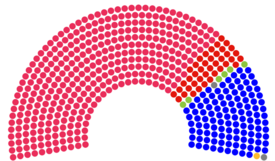National Congress: Difference between revisions
Jump to navigation
Jump to search
(Created page with "{{Infobox legislature | name =National Congress | native_name =Congresso Nacional | native_name_lang =Carinansian | transcription_name = | legislature =34th Session of the National Congress | coa_pic = | coa_res = | coa_alt = | coa_caption = | logo_pic = | logo_res = | logo_alt = | logo_caption = | house_type =unicameral | body =...") |
No edit summary |
||
| (One intermediate revision by the same user not shown) | |||
| Line 24: | Line 24: | ||
| new_session = | | new_session = | ||
| leader1_type =President of the National Congress | | leader1_type =President of the National Congress | ||
| leader1 =[[ | | leader1 =[[Samuel Murata]] | ||
| party1 =[[Union Socialist Party|PUS]] | | party1 =[[Union Socialist Party|PUS]] | ||
| election1 = | | election1 = | ||
| Line 51: | Line 51: | ||
| party7 = | | party7 = | ||
| election7 = | | election7 = | ||
| seats = | | seats =550 | ||
| house1 = | | house1 = | ||
| house2 = | | house2 = | ||
| Line 110: | Line 110: | ||
}} | }} | ||
The National Congress is the legislature of the federal government of [[Carinansia]]. It is unicameral, composed of | The National Congress is the legislature of the federal government of [[Carinansia]]. It is unicameral, composed of 550 senators chosen by direct election; some members representing at-large districts, and others specific regions of states, and vacancies are filled by temporary senators appointed by the state governors, who are to hold a special election a maximum of three months later. It meets in the National Congress Building in [[Distrito Central|Nojawa, D.C.]] All members have the right to cast a vote, and the Vice President serves as the President of the National Congress, able to cast a vote and propose legislation. | ||
== Overview == | |||
== History == | |||
=== 1960s - 2000s: Formative Era === | |||
=== 2000s - 2040s: Liberalising Era === | |||
=== 2040s - 2080s: Regressive Era === | |||
=== Since 2080: contemporary era === | |||
== Role == | |||
=== Powers === | |||
==== Overview ==== | |||
==== Enumeration ==== | |||
=== Checks and balances === | |||
== Structure == | |||
=== Committees === | |||
== Procedures == | |||
=== Sessions === | |||
== Public interaction == | |||
== Privileges == | |||
Latest revision as of 20:48, 6 November 2024
National Congress Congresso Nacional | |
|---|---|
| 34th Session of the National Congress | |
| Type | |
| Type | |
| History | |
| Founded | June 25, 1969 |
| Preceded by | Cortes Generales |
| Leadership | |
President of the National Congress | |
President huihuiti | Marilsa Vale Meireles, PTC |
National Congress Minority Leader | Ixcuiname Arias, PRC |
| Structure | |
| Seats | 550 |
 | |
| Government (399) Union Socialists (352) Supported by (47) PTC (40) Estatal Calumana (6) Independent (1) Opponent parties (114) PRC (112) São Lenoas State League (1) Independent (1) | |
| Elections | |
First election | 1969 Carinansian National Congressional Elections |
Last election | 2101 Carinansian National Congressional Elections |
Next election | 2103 Najolk, Tlanukoy, Ipudormite National Congressional Elections |
| Constitution | |
| Political constitution of the Serenacy of Carinansia | |
The National Congress is the legislature of the federal government of Carinansia. It is unicameral, composed of 550 senators chosen by direct election; some members representing at-large districts, and others specific regions of states, and vacancies are filled by temporary senators appointed by the state governors, who are to hold a special election a maximum of three months later. It meets in the National Congress Building in Nojawa, D.C. All members have the right to cast a vote, and the Vice President serves as the President of the National Congress, able to cast a vote and propose legislation.